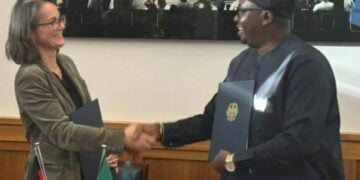President of the African Development Bank, Akinwunmi Adesina has revealed that 20 states in Nigeria have expressed interest to access over half a billion dollars in international financing to create agro-industrial zones in their states.
Delivering the keynote address at the annual BusinessDay CEO Forum, in Lagos, yesterday Adesina said Nigeria must make agriculture a major wealth-creating sector and financing is key.
The African Development Bank, International Fund for Agricultural Development, and the Islamic Development Bank last year approved $540 million to Nigeria to develop the first set of Special Agro-Industrial Processing Zones in nine states.
“An additional twenty state governments have expressed interest to be engaged for the second phase of the programme,” he said.
Though he did not reveal the states that have shown interest thus far, there has been a significant uptick in production from the states that previously accessed the funds.
The pilot phase of the programme sought to raise the output of commodities such as rice, cassava, and cocoa, which are grown in Cross River State, beef and dairy cattle in the Federal Capital Territory, livestock in Imo State, beef and dairy, tomato, maize, and ginger from Kaduna State, rice, tomatoes, groundnuts, and sesame oil from Kano State, livestock in Kwara State, cassava, rice, poultry, and fisheries in Ogun State, cassava, soybeans, and rice from Oyo State.
“ It is time to take bold policy measures to drive the structural transformation of agriculture, with infrastructure and spatial economic policies that will help turn the rural economies of Nigeria away from being zones of economic misery to new zones of economic prosperity,” Adesina said.
The AfDB boss said the key to this is the development of Special Agro-industrial Processing Zones (SAPZs) across the country.
These will be zones enabled with infrastructure and logistics, to support private sector food and agriculture companies to locate close to the areas of production and to process and add value to food and agricultural commodities.
He said this will turn cotton into textiles and garments, tomatoes into purees and tomato paste, milk into cheese, butter and substitute imported milk and drive massive transformation of finished rice products.
“In short, the Special Agro-Industrial Processing Zones will turn rural Nigeria from zones of economic misery into new zones of economic prosperity. The booming wealth will touch every part of Nigeria, and every person in Nigeria, from rural to urban areas,” he said.
The BusinessDay CEO Forum, now in its 14th edition, brings together decision-makers in the country’s private and public sectors to discuss emerging opportunities and prevailing challenges they encounter in running their organisations.
This year’s event was held in Lagos on July 13, with the theme “Charting a Course to Growth and Development” and explored what is required by business leaders to reposition for economic growth.
Mines Ministry, MinDiver Induct 3rd Batch Of Gemstone, Jewellery Trainees’ BY SILAS EZEUGWU, Abuja
The Ministry of Mines and Steel Development has commenced the third round of the training programme for skill acquisition in the jewelry and gemstone sub-sector of the mineral and metals industry.
The training, the third in the series of the skill acquisition programme funded by the World Bank through the Mineral Sector Support for Economic Diversification Project (MinDiver), has admitted 22 trainees from across the country for this batch.
During the induction of trainees at the Ministry’s Jewellery Training Centre in Abuja recently, project coordinator for MinDiver, Engr. Sallim Salaam, told the trainees that they should consider themselves fortunate to be selected for the programme, as the selection process was highly competitive.
Noting that the training, the first of its kind in Nigeria, was explicitly designed to equip graduates with the necessary skills to compete globally, he encouraged the batch three trainees to take the skill acquisition programme very seriously as the knowledge they would acquire would be valuable for a lifetime.
He advised the trainees to pay attention to their well-equipped instructors who can provide them with the best guidance as they were expected to train others upon the completion of their programme.
According to him, the programme was launched in November 2021 as part of the Ministry’s efforts to develop the downstream sector of the industry, create employment opportunities, empower young people, alleviate poverty, and create wealth.
He told them that the programme had yielded exciting results, with numerous graduates achieving great success as trainers nationwide.
He said there was so much potential in the jewellery-making sector, and if they remained focused and gained adequate knowledge, they could become employers of labour in no distant time.
He emphasised the importance of staying focused during the training, as it was designed to equip them with the necessary skills to become successful entrepreneurs, which was why the World Bank enlisted top-tier trainers to lead the programme.
He enjoined them to respect their instructors and obey all set rules governing the conduct and practice of the training programme.
MinDiver Co-Task Team Leader, Noora Arfaa, who visited the Jewellery Training Centre during her working visit to Nigeria to review the progress of activities under the project, told the trainees that she was excited to see them show interest in the vocation.
She also praised the level of hard work they put into the skill acquisition programme, which shows in the lovely pieces of work they have displayed, adding that from what she could see, many of them were obviously talented with the potential to impress on a bigger stage.
In a similar development, the local and international consultants and instructors on the programme led by Mr. Adebanjo Laurel Temitope paid a courtesy visit to the MinDiver project coordinator.
Mr. Temitope said they were on the visit to reassure the project of their plans to equip the trainees with the best possible skills within the time frame they have for the programme.
The team members included Nalinda Senavirathna, Anuva Sanatu Samavaweva (from Sri Lanka), Toyin Awodeji (from US) and other local trainers.
The project coordinator urged the consultants and the trainers to ensure that the purpose for which the federal government engaged them was achieved.





